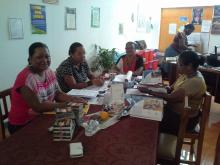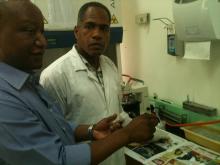Seychelles embarks on Neglected Tropical Diseases mapping survey
Victoria, Seychelles, 15th April 2015 - The Seychelles has embarked on a national mapping survey for Soil Transmitted Helminthes (STH) or otherwise known as intestinal worm infections. Funded by the World Health Organisation (WHO), this initiative is part of the global 2020 Neglected Tropical Disease Goals aimed at accelerating work in all countries to overcome the global impact of neglected tropical diseases (NTDs).
In the Seychelles, STH is the only neglected tropical diseases which can be effectively treated using large-scale administration of single dose medicines (PCT-NTD). As such, in November last year, a WHO consultant Dr.
Charles Mwandawiro spent two weeks in Seychelles to assist the country team with the preparation and conduct of an STH mapping exercise to determine the prevalence of STH in the country. During this mission, Dr Mwandawiro trained the national survey team on the survey methodology, which included sampling, specimen collection and processing using the Kato Katz method and data collection. Following the trainings, the national survey team under the leadership of Dr Louine Morel, the Registrar of the Communicable Diseases Control Unit (CDCU) sensitise teachers, parents and students in 6 randomly selected schools on the mapping exercise. The primary schools randomly selected included Cascade, Anse Boileau, La Rosiere, Bel Ombre, Takamaka and La Digue.
As per WHO standards, a total of 50 boys and girls aged 10 to 12 years from each of the 6 schools were randomly sampled out to provide stool samples which were analysed by Laboratory Technicians for STH. The preliminary results of the mapping exercise suggest a very low prevalence of STH infection in this age group in the Seychelles. Of the 148 stools analysed in the first stage of the mapping, only 4 samples (2.7%) were positive for STH.
The result is encouraging but expected in a country like the Seychelles where the population has good access to treated water supply and proper sewage system, facilities that eventually lead to great decline in worm infection nationally. The mapping exercise is expected to be completed by the end of April 2015 to provide evidence based information which will inform further actions to be taken on worm infestation in the country.
__________________________________________________
Doreen Hotive (Mrs)
NPO/HIP Officer
WHO Country Office for Seychelles
Tel: (248) 4224795
Fax: (248) 225754
Email: hotived [at] who.int (hotived[at]who[dot]int)
__________________________________________________
01. WHO Consultant Dr Mwandawiro discusses specimen processing procedure to one of the Laboratory Technician
02. Meeting with the management of one of the randomly selected schools to get their support for the mapping exercise





